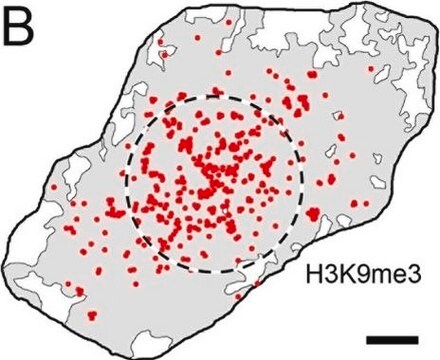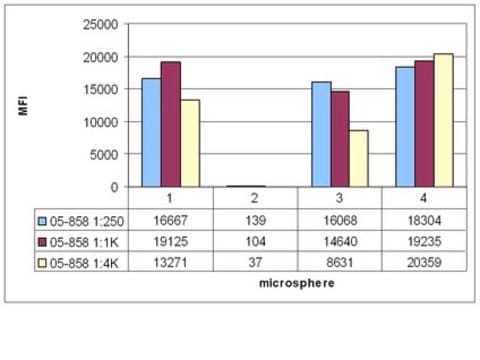06-598
Anti-acetyl-Histone H4 Antibody
1 mg/mL, Upstate®
Synonym(s):
H4 histone family, member A, histone 1, H4a, histone cluster 1, H4a
About This Item
Recommended Products
biological source
rabbit
Quality Level
antibody form
purified immunoglobulin
antibody product type
primary antibodies
clone
polyclonal
species reactivity
Tetrahymena sp., human
manufacturer/tradename
Upstate®
concentration
1 mg/mL
technique(s)
ChIP: suitable
immunocytochemistry: suitable
immunoprecipitation (IP): suitable
western blot: suitable
isotype
IgG
NCBI accession no.
UniProt accession no.
shipped in
dry ice
target post-translational modification
acetylation (Lys5,Lys8,Lys 12,Lys16)
Gene Information
human ... H4C1(8359)
General description
Specificity
Cross-reacts with acetylated histone H2B from Tetrahymena and weakly cross-reacts with acetylated histone H2B from HeLa cells. May crossreact with other acetylated proteins.
Immunogen
Application
5 μg of a previous lot immunoprecipitated acetylated histone H4 from 500 μg of acid extracted proteins from HeLa cells treated with 5 mM sodium butyrate for 24 hours.
Immunocytochemistry:
5-10 μg/mL of a previous lot lot gave positive nuclear immunostaining in human A431 cells treated with sodium butyrate and fixed with ice-cold 1% paraformaldehyde in PBS.
Chromatin Immunoprecipitation:
This antibody has been reported by an independent laboratory to immunoprecipitate acetylated histone H4 from chromatin.
Epigenetics & Nuclear Function
Histones
Quality
Western Blot Analysis:
0.5-2 μg/mL of this lot detected acetylated histone H4 in acid-extracted proteins from HeLa cells treated with 5 mM sodium butyrate. A previous lot detected acetylated histone H4 in Tetrahymena macronuclei. Sodium butyrate, an inhibitor of deacetylases, was used to enhance detection of acetylated histone H4.
Target description
Physical form
Storage and Stability
Handling Recommendations:
Upon receipt, and prior to removing the cap, centrifuge the vial and gently mix the solution. Aliquot into microcentrifuge tubes and store at -20°C.
Avoid repeated freeze/thaw cycles, which may damage IgG and affect product performance.
Analysis Note
TSA-treated NIH/3T3, A431, L929 (mouse) and C6 (rat) cell extracts, human breast carcinoma.
Legal Information
Disclaimer
Not finding the right product?
Try our Product Selector Tool.
Storage Class Code
12 - Non Combustible Liquids
WGK
WGK 1
Flash Point(F)
Not applicable
Flash Point(C)
Not applicable
Certificates of Analysis (COA)
Search for Certificates of Analysis (COA) by entering the products Lot/Batch Number. Lot and Batch Numbers can be found on a product’s label following the words ‘Lot’ or ‘Batch’.
Already Own This Product?
Find documentation for the products that you have recently purchased in the Document Library.
Our team of scientists has experience in all areas of research including Life Science, Material Science, Chemical Synthesis, Chromatography, Analytical and many others.
Contact Technical Service








